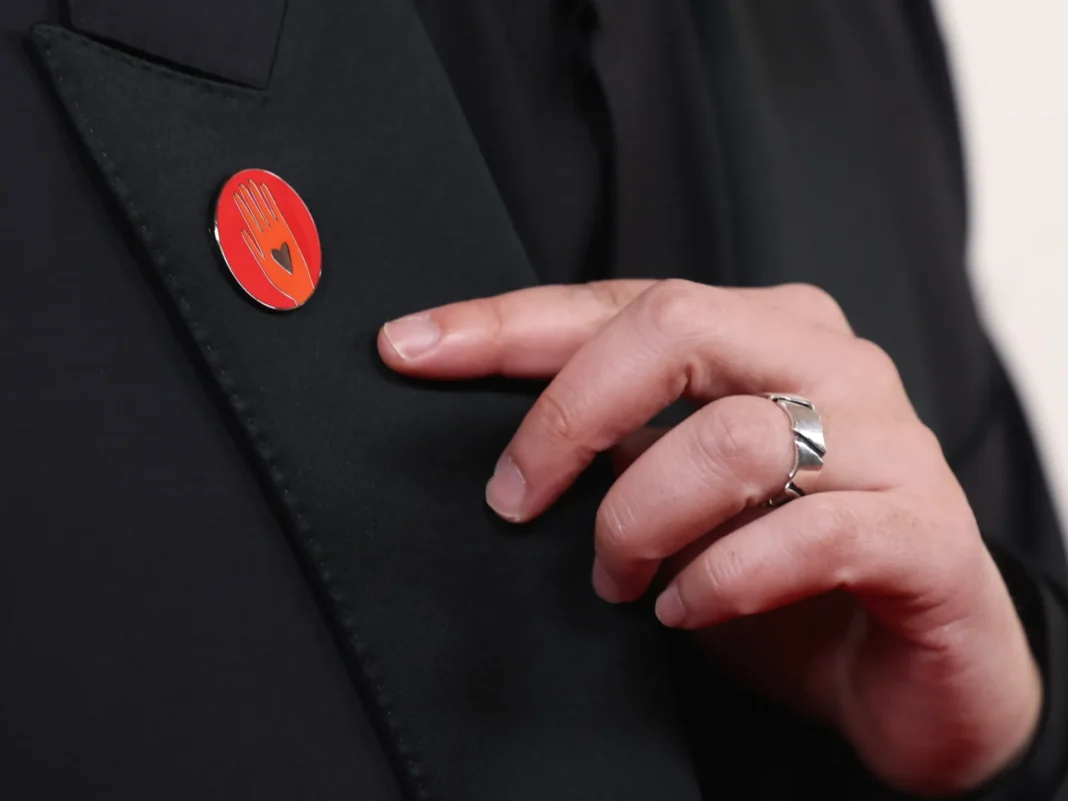|
Getting your Trinity Audio player ready...
|
Andrew Tobin(Free Beacon)
TEL AVIV, Israel—Israelis don’t usually pay much attention to the Oscars. But the ceasefire pins that celebrities wore at the Hollywood awards ceremony on Sunday struck a nerve here.
Michael Norzhich, 58, told the Washington Free Beacon that the pins—which feature a red hand inside of a circle—evoke the 2000 lynching of two Israeli reserve soldiers, including his younger brother. An iconic photo of the event shows one of the Palestinian killers holding up his blood-soaked hands as a mob cheers.
“It’s hard to say that it hurts because we see every day the world’s cynicism and ignorance about what happened,” Norzhich said. “But these people are supposed to be responsible for what they say and what they symbolize.”
The celebrities who took part in the symbolic protest—like singer Billie Eilish, actors Ramy Youssef and Mark Ruffalo, and director Ava DuVernay—”are either evil or stupid,” he added.
In the months since Hamas’s Oct. 7 terror attack on Israel, protesters have repeatedly used the symbol of bloody hands to condemn the Jewish state’s war against the Palestinian terror group. It has been part of a trend of anti-Israel activists evoking the language of Palestinian terrorism. Outside the Oscars, hundreds of protesters blocked traffic and chanted, “From the river to the sea, Palestine will be free,” a rallying cry for Palestinian terrorism that has become commonplace at such rallies.
The red pins were handed out by Artists4Ceasefire, a Hollywood group that, like Hamas, has demanded an immediate end to the Gaza war. Celebrities also wore the pins at the Grammys and the SAG awards.
“The pin symbolizes collective support for an immediate and permanent ceasefire, the release of all of the hostages and for the urgent delivery of humanitarian aid to civilians in Gaza,” the group said in a statement.
“We’re calling for peace and lasting justice for the people of Palestine,” Youssef told Variety on the Oscars red carpet. “It’s a universal message of: Let’s stop killing kids. Let’s not be part of more war.”
But for many Israelis, the pins have a darker message. On X, formerly Twitter, actress Noa Tishby called them a “subtle and overt display of Jew-hatred.” Activist Yoseph Haddad said they “support the side of a terrorist organization that committed a brutal massacre.”
Israeli government spokesman Eylon Levy shared the photo of the 2000 lynching, saying: “I don’t know if this is what the Hollywood stars wanted to echo with their bloody hand pins, but this is the association it has for Israelis, and if you’re not familiar with perhaps the most iconic image of the Second Intifada, maybe don’t broadcast your ignorance.”
Norzhich, a nurse and father of three from Or Akiva, suggested the Artists4Ceasefire activists educate themselves by visiting Auschwitz, the Nazi concentration camp in Poland, or Ramallah, the Palestinian capital in the West Bank.
“I invite them to come to Ramallah without any Israeli security,” he said. “I want to know what symbol they will leave with on their chest: a gunshot, a knife wound, or a hole from an RPG.”
On Oct. 12, 2000, Norzhich’s brother, Vadim Norzhich, and fellow reservist Yossi Avrahami ended up in Ramallah after taking a wrong turn. Palestinian Authority police officers arrested the Israelis, and a mob stormed the police station, stabbing and stomping the young men to death and gouging out their eyes.
Avrahami’s wife called his cellphone during the lynching, and a voice on the other end of the line said, “I have just killed your husband.”
Norzhich’s pregnant wife, whom he had married six days earlier, also phoned her husband that day. She heard someone speaking Arabic, and then the line went dead.
Irena Norzhich told the Free Beacon that she avoids any news related to her husband’s death and it is too painful to discuss.
Michael Norzhich said the family has never recovered from the death of his fun-loving little brother.
“My father has been closed up in his room for 23 years now,” he said.
The lynching—instantly encapsulated by the photo of the killer displaying his bloody hands from the police station window—changed Israel, too. It marked the beginning of the the second intifada, a years-long wave of Palestinian terrorism that largely crushed the Jewish public’s hopes for peace.
But according to Norzhich, the country failed to fully learn the lesson of that day. Over his objections, Israel in 2011 released 1,027 Palestinian security prisoners—including Aziz Salha, the killer from the photo—in exchange for the return of Gilad Shalit, an Israeli soldier captured by Hamas.
Also among the released Palestinian prisoners was Yahya Sinwar, the Hamas leader who is said to have masterminded the Oct. 7 attack.
“I knew it would happen. It was a matter of time,” Norzhich said of Oct. 7, when a Hamas-led mob killed more than 1,200 people, most of them Israeli civilians, and took 253 hostages, 130 of which remain in Gaza.
Israel has reportedly agreed to a U.S.-backed ceasefire deal under which it would release 10 prisoners for every hostage held by Hamas. But Hamas has rejected the agreement, demanding Israel permanently end the war and withdraw from Gaza.
Artists4Ceasefire, whose organizers have remained anonymous, did not respond to an interview request.





